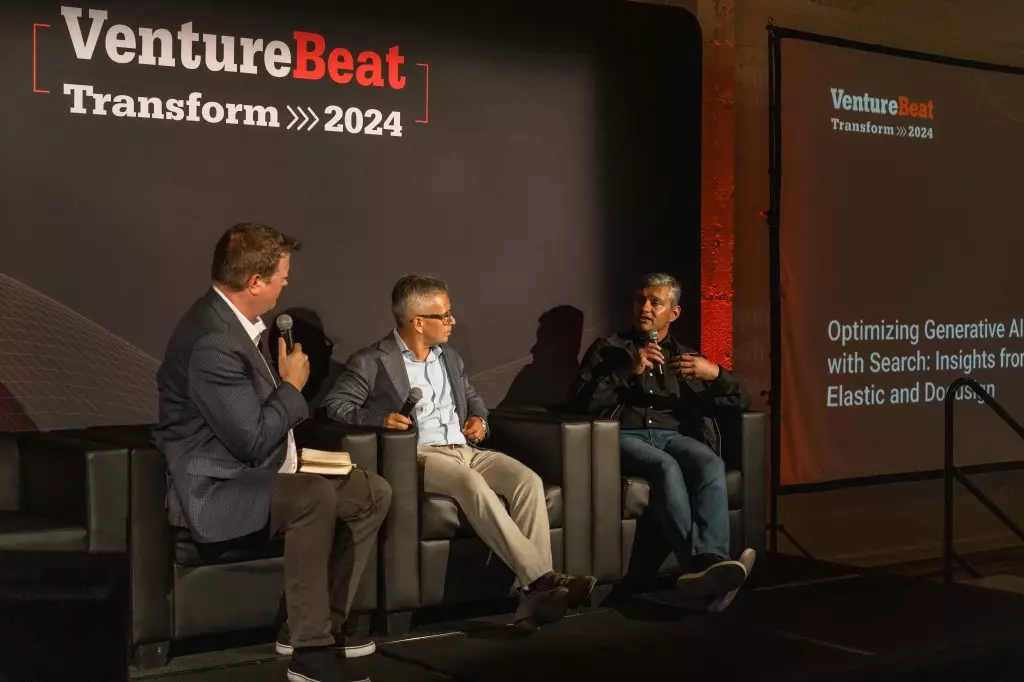In a recent discussion at VentureBeat’s Transform 2024 event, Elastic CEO Ash Kulkarni and DocuSign CPO Dmitri Krakovsky shed light on the impact of generative AI on enterprise search and contract management. The conversation centered around the growing significance of AI-powered search capabilities for businesses grappling with massive data volumes and intricate contractual relationships. Elastic’s approach to enterprise search has undergone a significant transformation with the integration of generative AI technologies. In May 2023, the company introduced the Elasticsearch Relevance Engine (ESRE), signaling a pivotal shift in its search technology strategy. ESRE merges traditional keyword-based search methods with advanced vector search capabilities, enabling a deeper understanding of context and semantics within extensive data repositories. This hybrid approach empowers Elastic to offer customers more sophisticated ways to retrieve relevant documents from their Elasticsearch repositories, whether through vector search, text search using BM25, or a combination of techniques.
Building upon its progress, Kulkarni highlighted Elastic’s incorporation of retrieval augmented generation (RAG) into its vector database technology. Describing Elastic as one of the most widely used vector databases, he emphasized the benefits derived from the integration of these features into the database functionality. With capabilities such as permissions, faceted search, hybrid search, and the ability to combine multiple search techniques like the BM25 basic search with vector search, Elastic is equipping developers with a comprehensive toolkit. Kulkarni underscored Elastic’s commitment to flexibility and developer choice, emphasizing the importance of empowering developers with a wide range of functionalities and model options. This ethos of openness and flexibility is deeply embedded in Elastic’s DNA, ensuring that customers have access to cutting-edge search capabilities that align with their unique requirements.
DocuSign is leveraging AI to revolutionize contract management, with Krakovsky outlining their vision for the future. The Intelligent Agreement Management (IAM) platform by DocuSign aims to transform static contract data into actionable insights, offering Maestro, Navigator, and App Center as core components for contract analysis. Krakovsky highlighted the platform’s ability to address a crucial gap in enterprise digitization, particularly in contract management where existing digitization efforts have resulted in unstructured PDFs scattered across organizations. By converting these static PDFs into structured, analyzable data, IAM enables organizations to gain a comprehensive understanding of their contractual relationships. Krakovsky shared a compelling example of a customer who identified inconsistencies and cost-saving opportunities amounting to over $100 million by systematically analyzing 70 contracts with a system integrator.
Both Elastic and DocuSign executives underlined the importance of responsible AI adoption, especially when dealing with sensitive data such as contracts. Krakovsky emphasized the need for caution and thorough consideration while implementing AI technologies, highlighting the importance of transparency and data security. DocuSign’s approach prioritizes transparency and explicit customer consent when leveraging customer data for training AI models. Moreover, both companies focus on delivering end-to-end solutions that address the entirety of the problem faced by customers, rather than offering fragmented solutions that require piecing together various components.
As the adoption of AI technologies accelerates, cost optimization has emerged as a critical factor. Efficient resource utilization is essential for sustainable AI scaling, especially for organizations dealing with extensive data volumes. Krakovsky emphasized the importance of optimizing resource consumption to maximize the value derived from AI solutions. Kulkarni predicted a decline in the cost of inference, driven by advancements in hardware technology and increased competition in the domain of large language models (LLMs). These developments are expected to reduce the barrier to entry for AI adoption and enable more organizations to harness the power of AI technologies.
Future Expansion of AI Capabilities
Looking ahead, both executives discussed the expanding capabilities of AI technologies and their implications for enterprise search and contract management. Kulkarni highlighted the emergence of multimodal AI models capable of processing diverse data types and delivering tailored responses across different modalities. Krakovsky outlined specific applications of AI in contract management, emphasizing the potential for automated identification of insights, ambiguities, and compliance-related issues within contracts. Real-world examples of AI applications in enterprise settings, such as Cisco using Elastic’s technology to streamline customer support processes and a Fortune 100 bank transforming client interactions through Elastic’s solutions, demonstrate the breadth of possibilities unlocked by AI-powered tools.
Challenges and Considerations in AI Adoption
While the potential applications of AI in enterprise search and contract management are vast, navigating technical, ethical, and operational challenges remains paramount. Issues related to data privacy, model transparency, and cost-effective scaling continue to be key considerations for organizations embarking on their AI adoption journey. By approaching AI adoption with caution, transparency, and a focus on delivering holistic solutions, companies can harness the transformative power of AI technologies while mitigating potential risks and challenges.


Leave a Reply